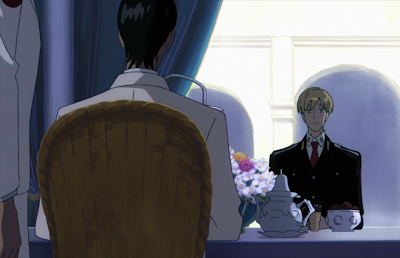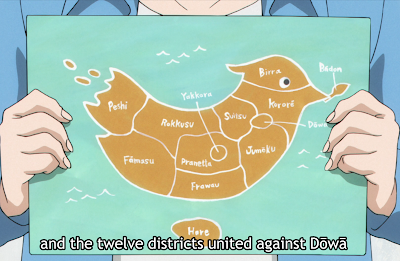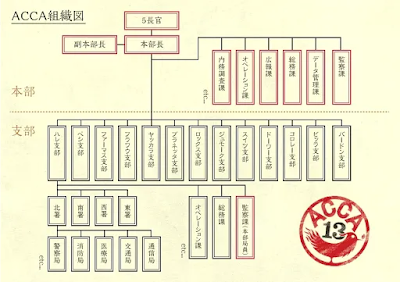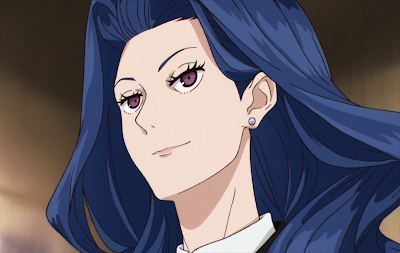Soon after, word of Jean Otus' royal lineage spreads to each of the districts, and news of King Falke's failing health hits the waves, instantly upping the tension as the final pieces slot into play. With the revelation of Jean's royal lineage, Chief Officer Grossular calls an emergency meeting with the Five Chief Officers. First, Grossular confirms that Jean is in fact royalty, then to the surprise of the other Chief Officers, he goes on to say that if there is to be a coup d'etat, then it should be lead by none other than ACCA-13 to prevent its dissolution and to ensure peace and stability of the Kingdom. Throughout this whole ordeal, the Five Chief Officers all have shown their distaste for the Crown Prince and their belief in the value of ACCA-13. A quick vote is held, and there is unanimous consent among the Five Chief Officers. ACCA-13 will spearhead the coup d'etat to overthrow the Dowa family.
 |
| Chief Officer Grossular suggests ACCA-13 lead the coup. |
Having successfully gained the consensus of the other Chief Officers, Grossular and Ilium meet privately. When a down trodden Grossular voices his concerns that it may not all go according to plan, Lilium aggressively yanks Grossular by the hair, asserting that he is confident that Grossular will ensure it will all go according to plan. In a series of flashbacks, we now learn that it was Lilium and albeit reluctant Grossular who set the plans in motion to create the appropriate scenario for which a coup d'etat can be triggered. Using Grossular's loyalty to ACCA-13 and his desire to protect the Kingdom, Lilium had persuaded Grossular to participate in this conspiracy to overthrow the throne.
 |
| Chief Officer Lilium threatens Chief Officer Grossular. |
Meanwhile, Jean Otus continues his audits across the Kingdom and arrives at the Furawau district, where Lilium and his family hail. In Furawau, Jean learns that Lilium is a member of a prestigious and wealthy Furawau family, with many of its members holding positions of significance both in ACCA-13 and the legislative. Furawau district is also well known for its abundant natural resources, particularly in oil, and provides 90% of the Kingdom's oil supply. While this has granted the district a certain amount of prosperity and political significance, the importance of the resource to the Kingdom has rendered Furawau limited in its ability to dictate the distribution of its resources, which has been a point of contention since its federation. Meeting with the Furawau branch Chief, who is incidentally the younger brother of Lilium, Jean is offered in no uncertain terms Furawau district's full support in the coup d'etat. From this meeting, Jean walks away with the impression that Lilium and his family is far more vested in the coup d'etat as a means to advance Furawau's interests rather than protecting the Kingdom's future from the Crown Prince.
Returning to Badon, Jean Otus seeks out Lilium, who spares no time and immediately affirms his intent to support the coup d'etat and requests Jean to take the mantle as the new ruler of the Kingdom. Jean agrees on the spot and also notes that during his audits throughout the districts, he has gotten the support of each of the district's branch Chiefs for the coup d'etat.
 |
| Jean meets Furawau's branch chief. |
With Jean's audits concluded, ACCA-13 now prepare for the upcoming centennial anniversary of ACCA-13's founding, and all the senior officers from the branch offices and Headquarters gather in Badon. During the ceremony, the Crown Prince is expected to give a speech in lieu of King Falk's absence given his recent downturn in health, and it is this moment that the conspirators plan to announce their coup d'etat to the public, and to take the Crown Prince under custody before installing Jean as the next ruler of the Kingdom. At least, that is the plan as is known to Chief Officer Lilium and his Furawau compatriots.
 |
| ACCA-13 officers discuss their plan to overthrow the throne. |
It is now the day of the celebration, and up on stage are all the high ranking officers of ACCA-13, including the Five Chief Officers, Director-General Mauve, and Jean Otus. They are also joined by Crown Prince Schwan and his personal guards. Following a rather uneventful series of speeches by each of the senior officers, the Crown Prince takes up the podium to deliver his speech, but is instantly interrupted by an outpouring of armed ACCA-13 officers. Addressing the confused and shocked crowd, Lilium announces that ACCA-13, an agency for peace and stability, is being targeted for dissolution by the Crown Prince once he takes the throne, and in the interests of the people and the future of the Kingdom, ACCA-13 has decided to preempt the Crown Prince. The crowd bursts in clamor in confusion and dismay as people voice concerns over the Crown Prince's aptitude as ruler and the future of the Kingdom, and their wishes for ACCA-13 to continue to exist.
 |
| The centennial celebration of ACCA-13's founding. |
 |
| Crown Prince Schwan surrounded by ACCA-13 officers. |
Just as it appears that all the cards are now in the hands of the conspirators, Director-General Mauve steps forward to silence the crowd. Lilium is surprised as this was not part of the plan, but is unable to stop her as she begins to speak. Addressing both the Crown Prince and the crowd, Mauve explains the situation. In expectation of the Crown Prince's expected ascension to the throne, ACCA-13 wished to prepare this theatrical display knowing that the Crown Prince was predisposed to traveling without a large security entourage. The intent was to teach him the importance of his security and responsibility that he has as the future ruler of the Kingdom. Mauve apologizes for such an unplanned event and thanks the Crown Prince for his participation in the act, and wishes for his health and prosperity as the next King. Reading the crowd's negative reaction to Lilium's claim that the Crown Prince wished to dissolve ACCA-13, the he finds no recourse but to accept Mauve's explanation and announce that he is impressed by ACCA-13's concern for him and that he has no intent to do away with ACCA-13.
This is met with applause from the crowd, as a furious and disappointed Lilium turn to the Five Chief Officers and Jean. With a satisfied look, Jean simply explains to Lilium that when all the senior officers gathered in Badon for the celebration, they had conspired separately to prevent Lilium and Furawau's plot from coming into fruition. Having been utterly defeated, Lilium departs the stage, and the following day, it is announced that Furawau has seceded from the federation, taking with them their natural resources. Thus concludes the conspiracy that threatened the Dowa Kingdom into another potential civil war.















